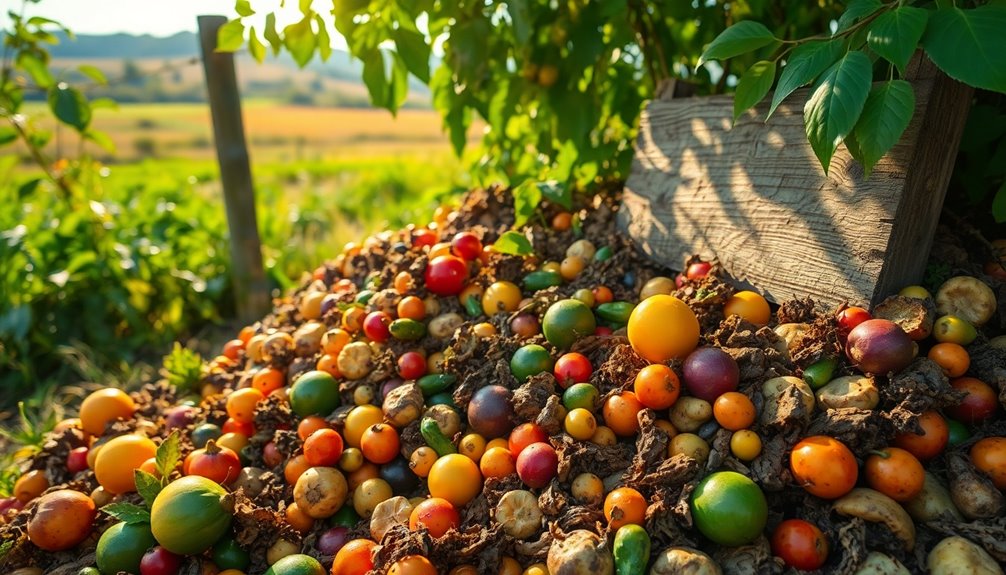Food waste greatly harms the environment by depleting essential resources and worsening climate change. When food decomposes in landfills, it releases methane, a strong greenhouse gas. You can help by making mindful food choices, managing your portions, and planning meals efficiently. Consider composting scraps to enhance soil instead of discarding them. Additionally, support local initiatives by participating in community gardens or food recovery efforts. Every action matters in reducing waste and promoting sustainable practices. By grasping the wider impact of your choices, you can make a tangible difference and explore even more efficient strategies.
Key Takeaways
- Food waste contributes to climate change by releasing methane in landfills, a greenhouse gas much more potent than carbon dioxide.
- Mindful food choices and meal planning can significantly reduce food waste and its environmental impact.
- Composting food scraps enriches soil and minimizes landfill contributions, promoting sustainable waste management practices.
- Community initiatives, like food drives and partnerships with local farms, help redistribute surplus food and strengthen community ties.
- Proper food storage techniques and portion control can extend food shelf life and minimize waste in households.
Understanding Food Waste
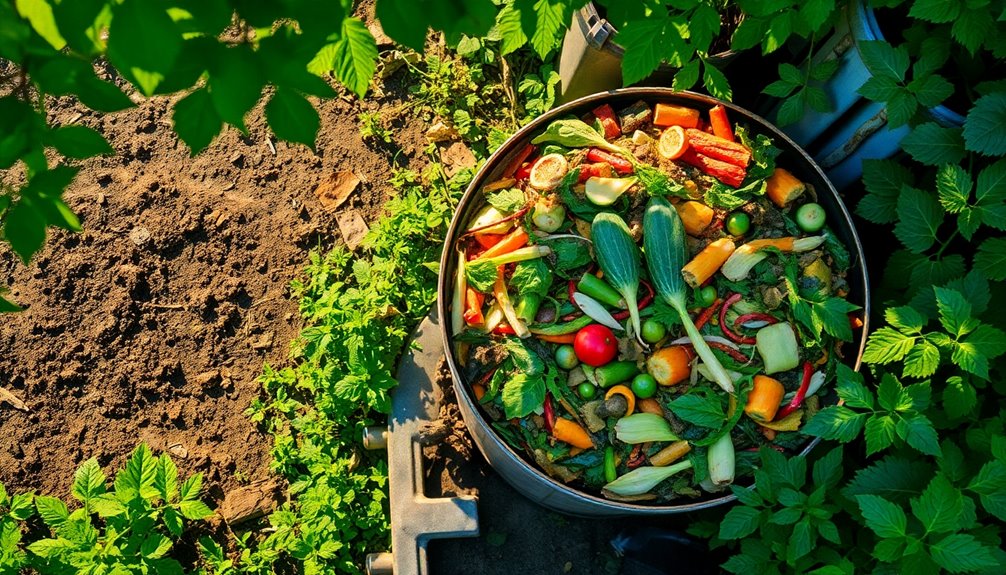
Food waste is a pressing issue that you mightn't think about often, but it has significant environmental repercussions. Understanding food waste begins with recognizing its scale and the patterns in your food consumption.
You might be surprised to learn that approximately one-third of all food produced globally is wasted. This loss not only squanders resources like water and energy but also contributes to a culture of excess that many of us participate in without realizing the impact.
To tackle this issue effectively, you need to engage in behavior change. Start by evaluating your shopping habits; are you buying more than you can realistically consume? Meal planning can help you make informed decisions that reduce waste. Instead of impulsively purchasing items, think about what you truly need.
Moreover, being mindful of portion sizes at home and during meals can make a substantial difference. If you find yourself consistently throwing away leftovers, consider cooking smaller batches or finding creative ways to use up surplus food. Incorporating a plant-based diet can also contribute to reducing food waste, as it often involves using whole foods that can be utilized in various recipes.
Joining a community focused on reducing food waste can also amplify your efforts. Sharing tips and strategies with others fosters a sense of belonging and encourages collective action, which can lead to significant change.
Ultimately, understanding food waste is about recognizing your role in the larger system and taking proactive steps. By making small adjustments in your daily life, you can contribute to a meaningful reduction in food waste and promote a more sustainable future for everyone.
Environmental Consequences
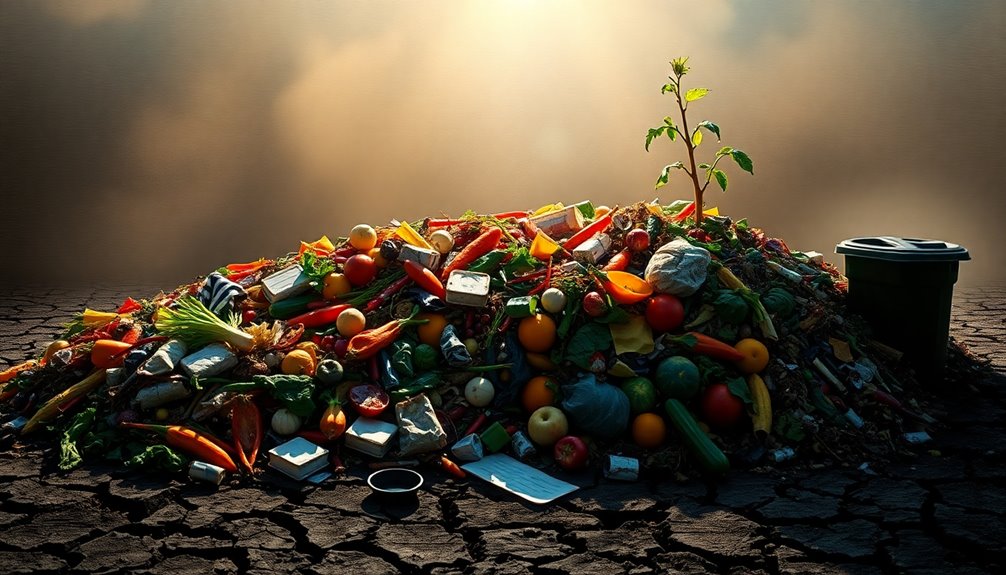
Have you ever considered the environmental consequences of food waste? When you throw away food, it doesn't just vanish; it contributes significantly to climate change and biodiversity loss.
In landfills, food decomposes anaerobically, producing methane—a potent greenhouse gas that's over 25 times more effective at trapping heat than carbon dioxide. This process directly ties into fossil fuel emissions, as the excessive energy used in food production, transportation, and storage adds to our carbon footprint.
Every time you waste food, you're also neglecting the resources that went into producing it. Water, land, and energy are all expended in growing and processing food. This contributes to habitat destruction, as agricultural expansion leads to the loss of diverse ecosystems.
When biodiversity diminishes, the natural balance of our environment suffers, affecting everything from pollination to natural pest control.
You can be part of the solution. By being mindful of your food choices and portion sizes, you can help reduce food waste. Consider meal planning or composting as effective strategies to minimize the impact of your food habits. Joining local food recovery initiatives not only helps the environment but also connects you with your community, creating a sense of belonging. Additionally, adopting effective nutrition programs can promote sustainable food practices that align with reducing waste.
Ultimately, recognizing the environmental consequences of food waste empowers you to make sustainable choices. Together, we can mitigate fossil fuel emissions and protect our planet's biodiversity for future generations.
Economic Impact
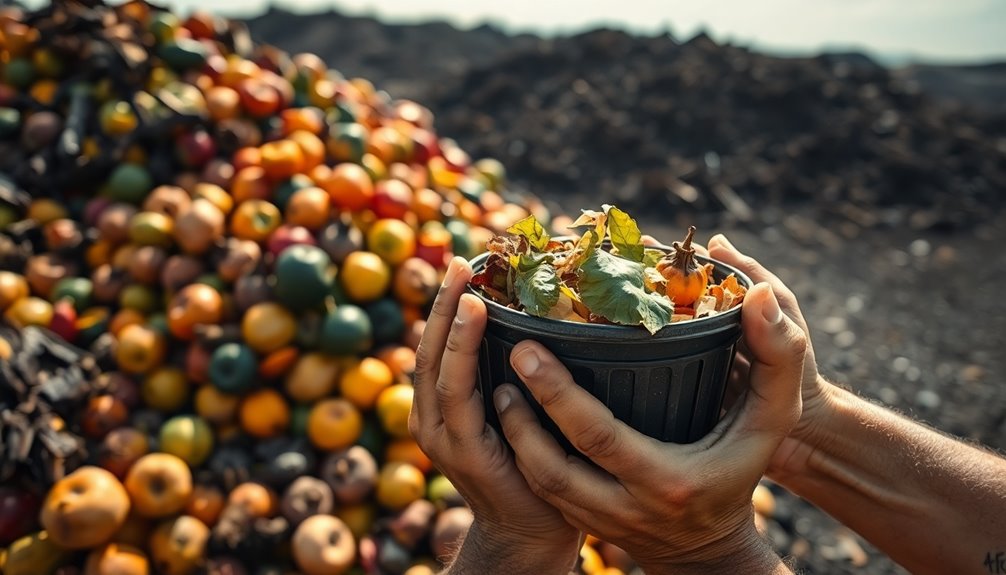
The economic impact of food waste is staggering, affecting not just individual households but entire economies. When you think about the financial implications, it's clear that wasted food represents a loss of resources, labor, and capital. You're not just tossing out leftovers; you're discarding money and opportunities. Recognizing these losses can shift your perspective on how you manage food in your life.
Here are some key economic impacts of food waste:
- Household Costs: On average, families waste about $1,500 annually on food that ends up in the trash. That's a significant sum that could be better spent.
- Market Trends: As awareness of food waste rises, consumers are increasingly demanding sustainable practices from businesses, pushing companies to innovate and reduce waste.
- Job Losses: The food waste crisis can lead to job losses in agriculture and waste management sectors, creating a ripple effect throughout the economy.
- Increased Prices: When food is wasted, it contributes to higher prices for consumers. Reduced supply due to waste can strain market availability, leading to inflated costs.
Strategies to Reduce Waste
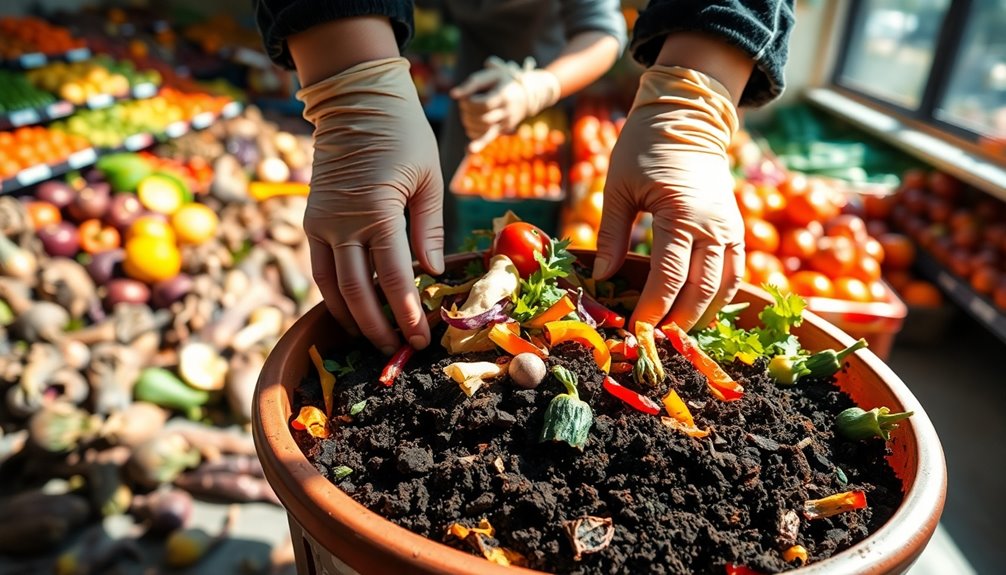
To tackle the urgent issue of food waste, individuals and businesses alike must adopt targeted strategies that effectively minimize unnecessary discards. Understanding consumer behavior plays an important role in this endeavor. By recognizing the patterns and preferences that drive your purchasing decisions, you can make informed choices that lead to less waste.
For instance, buying only what you need and opting for smaller portions can greatly reduce the food you end up throwing away.
On the business side, examining the supply chain is crucial. Companies should work to identify inefficiencies that lead to waste, from production to distribution. Implementing better inventory management systems can help guarantee that perishable items are sold before they expire. Collaborating with suppliers to forecast demand accurately can also reduce surplus that often results in waste.
Another effective strategy is to embrace creative solutions for leftovers. Whether it's repurposing food scraps into new meals or utilizing technology to track expiry dates, you can find innovative ways to keep food in circulation longer. Encourage others around you to adopt these practices, fostering a community focused on reducing waste.
Ultimately, it's about creating a culture of mindfulness around food consumption. As you engage in these strategies, you contribute to a larger movement aimed at protecting our environment. By taking these steps, you're not just reducing waste; you're becoming part of a collective effort that values sustainability and responsibility.
Community Initiatives
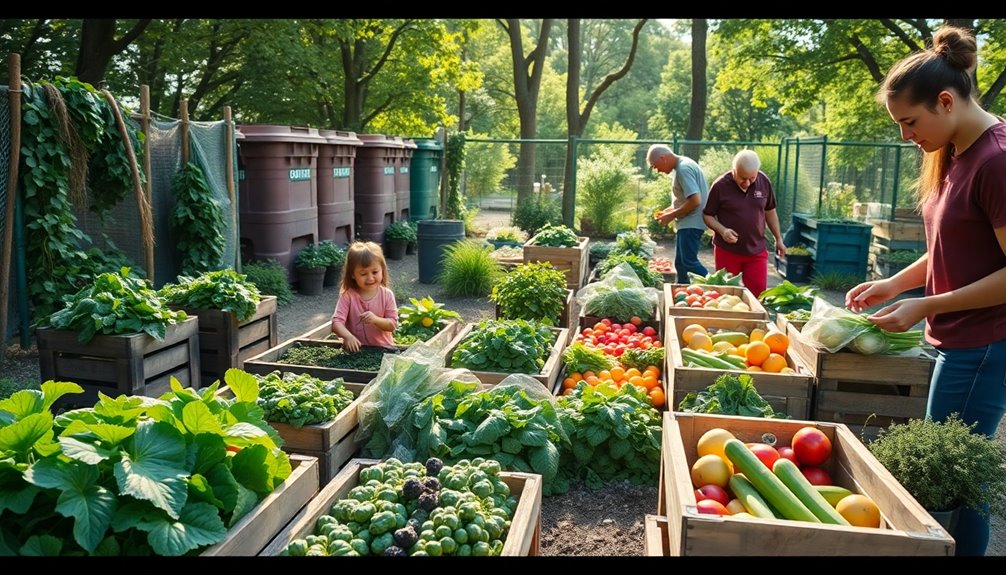
Recognizing the power of community initiatives can greatly improve efforts to combat food waste. When you engage with your local community, you not only foster a sense of belonging but also contribute to meaningful change. Here are some ways you can get involved and make a difference:
- Join or Start Community Gardens: These spaces allow you to cultivate fruits and vegetables, reducing reliance on store-bought produce and minimizing waste from packaging.
- Form Local Partnerships: Collaborate with local businesses and farms to create networks that redistribute surplus food to those in need. This helps guarantee that perfectly good food doesn't end up in landfills.
- Participate in Volunteer Opportunities: Many organizations focus on food recovery and waste reduction. Volunteering your time can help spread awareness about food waste and support initiatives that address the issue.
- Engage in Collective Efforts: Organize events like food drives or cooking classes to educate others on minimizing waste. These gatherings can strengthen community bonds and inspire collective action. Additionally, implementing brainwave guidance technology can enhance mindfulness in these community efforts, promoting awareness of food waste issues.
Personal Action Steps
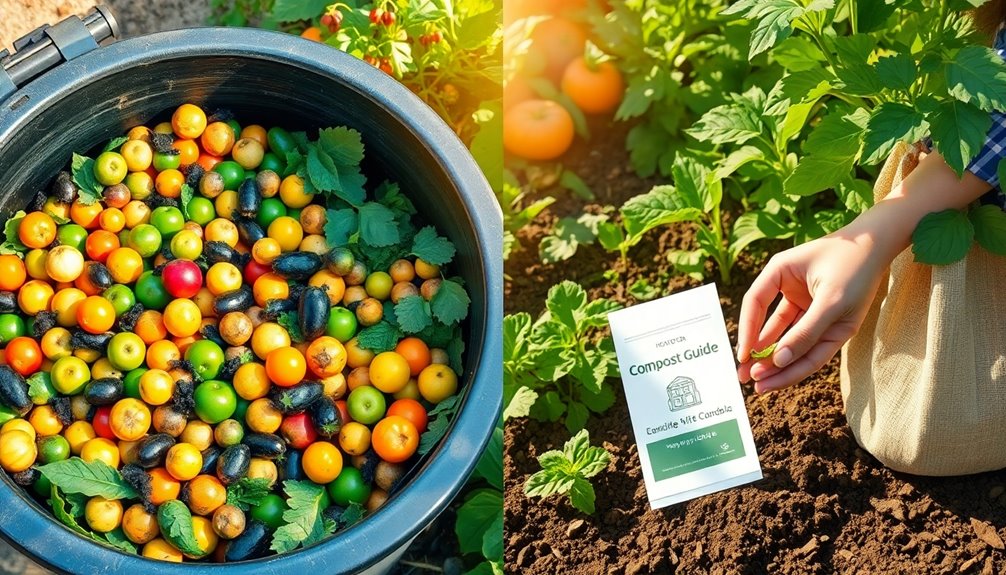
Taking personal action against food waste can greatly contribute to environmental sustainability. You have the power to influence consumer behavior and create a ripple effect in your community. Start by evaluating your shopping habits. Plan your meals for the week, make a shopping list, and stick to it. This reduces impulse buys and helps you purchase only what you need, minimizing potential waste.
When you're at home, practice proper food storage techniques. Learn how to store fruits and vegetables to extend their shelf life. Use clear containers for leftovers, so you can see what you have and avoid forgetting about them. Remember, it's okay to freeze food that you can't use right away. This simple step is one of many sustainable solutions that help you reduce waste.
Additionally, consider composting. It's an effective way to manage food scraps and enrich your garden soil. If composting seems overwhelming, start small—just keep a separate bin for scraps until you're ready to take the plunge.
Finally, engage with your friends and family about food waste. Share your experiences and tips. By fostering conversations, you can inspire those around you to adopt similar practices, creating a supportive community focused on sustainability. Many people have found that incorporating smoothies into their diet can also help reduce food waste while promoting better health.
Your choices matter. By making these small adjustments in your daily life, you not only contribute to reducing food waste but also inspire a collective movement towards a more sustainable future. Embrace the challenge—together, we can make a significant impact.
Frequently Asked Questions
What Are the Main Causes of Food Waste at Home?
You mightn't realize it, but your consumer behavior plays a huge role in food waste at home. Buying in bulk can lead to spoilage if you don't plan meals effectively. Plus, improper storage methods can accelerate decay. Using clear containers and labeling can help you track what you have. By becoming more mindful of your purchasing habits and improving how you store food, you can markedly reduce the waste generated in your kitchen.
How Does Food Waste Affect Climate Change?
Imagine a garden where wilted plants suffocate under layers of discarded food. Each forgotten scrap in landfills releases methane, a potent greenhouse gas that traps heat in our atmosphere. These emissions impact the climate, exacerbating global warming.
When you waste food, you're not just letting meals rot; you're contributing to a cycle that harms our planet. By reducing food waste, you can cultivate a healthier environment for all, nurturing both community and earth.
Are There Specific Foods That Are Wasted the Most?
You might be surprised to learn that fruits and vegetables top the list of wasted foods, often due to short shelf lives and expiration dates.
Bread and dairy also contribute considerably to waste, as do leftovers that aren't consumed in time.
Meat and seafood follow, often discarded because of improper planning.
Packaged goods can accumulate and spoil if you don't plan your meals effectively.
What Role Do Retailers Play in Food Waste?
Imagine a bustling grocery store, where fresh produce glistens under bright lights, yet much of it ends up in the trash. Retailers have a pivotal role in waste management, taking on retailer responsibility to minimize waste. By implementing better inventory practices and engaging in consumer education, they can raise awareness about food preservation.
You can join these efforts by supporting stores that prioritize sustainable practices, fostering a community that values every morsel.
How Can Technology Help Reduce Food Waste?
Technology can greatly help you reduce food waste through innovative solutions like food tracking and smart storage. By using apps that monitor your pantry, you'll know what you have, preventing overbuying. Smart storage systems can extend the life of your food by optimizing conditions like temperature and humidity. Embracing these tools not only minimizes waste but also fosters a sense of community, as you connect with others committed to sustainable living.
Conclusion
As you reflect on the staggering consequences of food waste, remember the old adage, "waste not, want not." By taking action—whether through mindful shopping or supporting local initiatives—you can be part of the solution. Together, we can transform our habits and reduce our environmental footprint, ensuring a healthier planet for future generations. Embrace these strategies, and you'll not only nourish your community but also cultivate a sustainable future, proving that small actions can indeed spark significant change.

